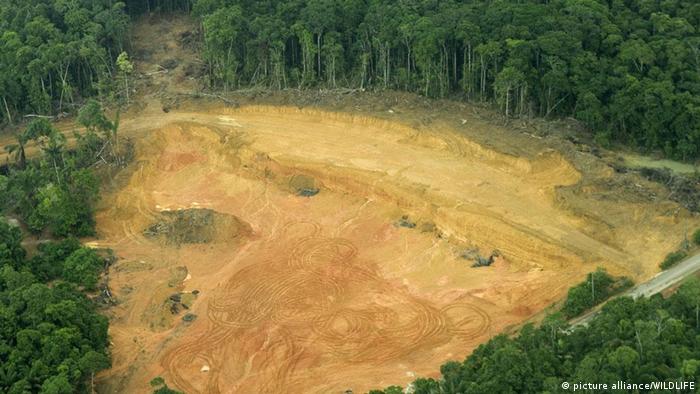Search Results for Tag: Brazil
Rio plus you

Stefan Rostock, Germanwatch
Author: Kerstin Schnatz
A huge disappointment, a good basis to work from or “a major step forward in achieving a sustainable future” as the United Nations have put it? Depending on who you ask, the outcome of the United Nations Conference on Sustainable Development in Rio de Janeiro in June 2012 is evaluated differently.
In the run-up to the so called Rio+20 Earth Summit, we had asked our Global Ideas crowd to forward their questions to participants of the summit. In Rio, our reporters Philipp and Kerstin asked Stefan Rostock from the non-governmental organisation Germanwatch to answer them. Stefan followed the negotiation process very closely – listen to his answers:
Stefan Rostock Germanwatch by ideasforacoolerworld
About Germanwatch
The non governmental organisation Germanwatch advocates for a more sustainable future in countries of the so-called “South”. It researches and highlights the global consequences that economies and politics of industrialized states have on developing and threshold states – situated mostly in the geographical South of the planet. Germanwatch is based in Bonn and Berlin.
About Rio+20
The United Nations Conference on Sustainable Development took place in June 2012 in Rio de Janeiro, Brazil. With almost 30,000 participants from all around the world including representatives of 191 UN member states as well as 10,000 NGO people and almost 4,000 journalists, it was the biggest conference in the history of the United Nations. Download the 50-page outcome document “The future we want”.
Rio’s romance with renewable resources
Author and pictures: Kerstin Schnatz
Cups made from corn or electricity from sugar cane: Rio is eager these days to show that it can be environmentally friendly. The city is hosting the United Nations conference on Sustainable Development – better known as Rio+20. While the official part is only starting on Wednesday (June 20) the congress venue is already open for preparatory meetings and non-governmental events.
The Brazilian government is trying to make a point, it seems, of just how much it values the use of renewable resources such as corn or sugarcane. Indeed, Brazil is well known as a biofuel-country: The standard blend cars run on consists of up to 25 percent of biofuel for example. Even the Brazilian airline that flew us in bragged about its green commitment in the inflight magazine. The carrier plans to operate a domestic flight on biofuel especially for Rio+20.
Whilst renewable resources may emit less CO2 than fossil fuels, depending on how they are processed and transported, they can of course also create a lot of problems – monocultures, conflict between food and fuel production or soil degradation to name just a few.
Bizarre but valuable: Top 10-list of new species 2011 draws attention to biodiversity
Short time ago the International Institute for Species Exploration at Arizona State University anounced their picks for the top 10 new species described in 2011. It’s the fifth time in a row that attention-grabbing species have been nominated to open the world’s eyes for “the biodiversity crisis and the unsung species explorers and museums who continue a 250-year tradition of discovering and describing the millions of kinds of plants, animals and microbes with whom we share this planet,” as Quentin Wheeler, an entomologist who directs the International Institute for Species Exploration at ASU, said.
When you have a look at the gallery below you will have to admit that this year’s list is quite exquisit. It’s members come from Brazil, Myanmar, the Dutch Caribbean, South Africa, Papua New Guinea, Spain, Borneo, Nepal, China and Tanzania. You will find a sneezing monkey there, a beautiful but venomous jellyfish, an underworld worm and a fungus named for a popular TV cartoon character.
The nominations had to be “species that capture our attention because they are unusual or because they have traits that are bizarre,” said Mary Liz Jameson, an associate professor at Wichita State University who chaired the international selection committee. At the institute’s website you will also find a Google world map that pinpoints the location for each of the top 10 new species.
New brazilian land law softens environmental regulations, WWF alarmed
 The Brazilian parliament has adopted a new, hotly-debated land law. Environmentalist fear that it puts the country’s rainforest, one of the world’s richest, at high risk.
The Brazilian parliament has adopted a new, hotly-debated land law. Environmentalist fear that it puts the country’s rainforest, one of the world’s richest, at high risk.
Large landowners and peasants benefit from the law, because it eases existing restrictions: landowners are no longer bound to reforest riverbanks, for example, and environmental regulations have also been softened.
![]() read more
read more
Brazil’s new forest law
 As the world tries to find ways the reduce global emission in Durban, Eco, a publication of Climate Action Network CAN at COP17, is reporting on Brazils plans of igniting a real carbon bomb. A bill to change the country’s Forest Law is supposedly about to be approved, resulting in the increase of deforestation. The proposed bill, they say, will be sent to President Dilma Roussef for final cinsideration in coming weeks. One of the foreseeable consequences is that an area almost the size of France and Great Britain combined will loose legal protection, according to estimates presented by the Brazilian government itself. Since Brazil will be hosting the Rio+20 con fence next year, the situation is even more delicate.
As the world tries to find ways the reduce global emission in Durban, Eco, a publication of Climate Action Network CAN at COP17, is reporting on Brazils plans of igniting a real carbon bomb. A bill to change the country’s Forest Law is supposedly about to be approved, resulting in the increase of deforestation. The proposed bill, they say, will be sent to President Dilma Roussef for final cinsideration in coming weeks. One of the foreseeable consequences is that an area almost the size of France and Great Britain combined will loose legal protection, according to estimates presented by the Brazilian government itself. Since Brazil will be hosting the Rio+20 con fence next year, the situation is even more delicate.
In the corridors at Durban, these developments are causing considerable consternation. It is expected that Brazil President Dilma Roussef will send a clear message to the world that the country will meet all commitments announced previously in fighting climate change and protecting the Brazil forest.











Feedback